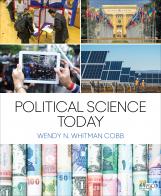Political Science Today
Political Science Today
Welcome to the SAGE edge site for Political Science Today.
The SAGE edge site for Political Science Today by Wendy N. Whitman Cobb offers a robust online environment you can access anytime, anywhere, and features an impressive array of free tools and resources to keep you on the cutting edge of your learning experience.
“This is a solid textbook for an intro course... It follows different approaches in the discipline, going subfield by subfield from Political Theory to American Politics, Comparative, and IR. It has a strong introductory chapter that helps disentangle the relation between politics and political science.”
—Manuel Balan, McGill University
Political science has changed; the way students learn has changed; so too should the way it’s taught. This is political science, today.
Political Science Today by Wendy Whitman Cobb gives students a holistic view of the subfields that make up political science by dedicating one chapter to each of the topics at the core of the discipline. Unlike denser texts on the market, Political Science Today uses a field-based approach that allows students to engage with the material directly and dig into each of the discipline’s diverse subfields while also developing critical thinking skills, discerning the differences between politics and political science, conducting and consuming research, and broadening their future career aspirations.
The book’s innovative table of contents begins with foundational tools like theories and research methods, then builds up to subfield chapters on Comparative Politics, International Relations, American Government, Political Economy, and Public Policy and Administration. Current case studies throughout the text provide a backdrop for engaging classroom discussions on topics such as President Trump’s travel ban, ISIS as a state, and strengths and weaknesses of the United Nations. This unique approach provides short segments of topic coverage, plenty of summarizing content and review questions, as well as comprehensive learning objectives which will help students understand the realities of political science today.
Acknowledgements
We gratefully acknowledge Wendy N. Whitman Cobb for writing an excellent text. Special thanks are also due to Alicia Fernandez and Pete Tunkis for developing the ancillaries on this site.
For instructors
Access resources that are only available to Faculty and Administrative Staff.
Want to explore the book further?

